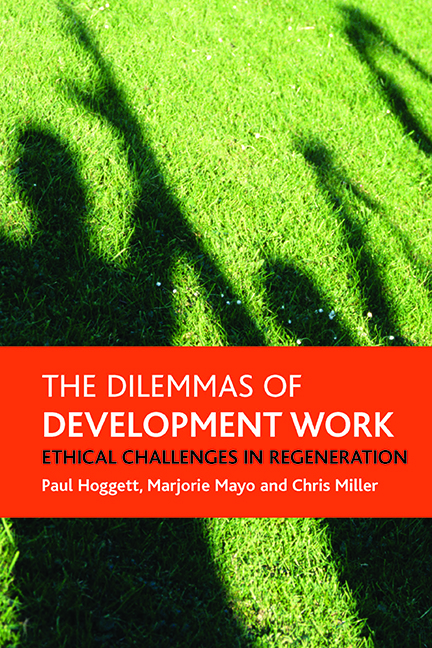seven - Handling authority relations
Published online by Cambridge University Press: 21 January 2022
Summary
Power and authority relations pervade development work
Development workers are immersed in complex relations of power and authority, two related although too often blurred concepts. Authority is central to the analysis of public institutions and needs to be explored as such, together with an exploration of the underlying structures of power that underpin them. Development workers are centrally involved with the impact of decisions made by those with power and authority, as these decisions impact on the communities that they serve: policy decisions with significant implications for public services such as housing, education, health and welfare provision, for example. The development worker has a brief to enable service users and communities to challenge such decisions, unpacking the structures of power that underpin them and calling authorities to account as part of the democratic process. But this is only one dimension of authority, as this impacts on the development role. Authority not only attaches to formal positions within state bureaucracies but is also crucial to the exercise of discretion by public officials, particularly in negotiating the dilemmas of face-to-face ‘street-level’ work (Lipsky, 1980). Development workers exercise authority themselves, whether positively or negatively, when facilitating or containing the frustrations and conflicts within communities. In such a ‘dilemmatic space’ where values, meanings and actions, means and ends, are highly contested, the effective use of one's own authority is critical in relation to both axes of power and authority.
In this chapter we re-examine a number of existing analyses of power and authority in the light of our research. First we identify how some of the dilemmas of regeneration work involve the exercise, negotiation or contestation of authority. We then examine earlier attempts to theorise power and authority, from Max Weber through to Richard Sennett, using our research to illustrate these approaches before offering some criticisms and alternatives. We suggest that alternative approaches need to offer a more dynamic model of authority relations, less institutionally oriented, giving less emphasis to ‘positional authority’ and additional consideration to ‘reputational’ and/or ‘personal’ authority. We argue that the latter is particularly pertinent to the exercise of discretion and we offer an examination of its origins and the ways in which it is mediated by considerations of class, ‘race’ and gender.
- Type
- Chapter
- Information
- The Dilemmas of Development WorkEthical Challenges in Regeneration, pp. 109 - 128Publisher: Bristol University PressPrint publication year: 2008



